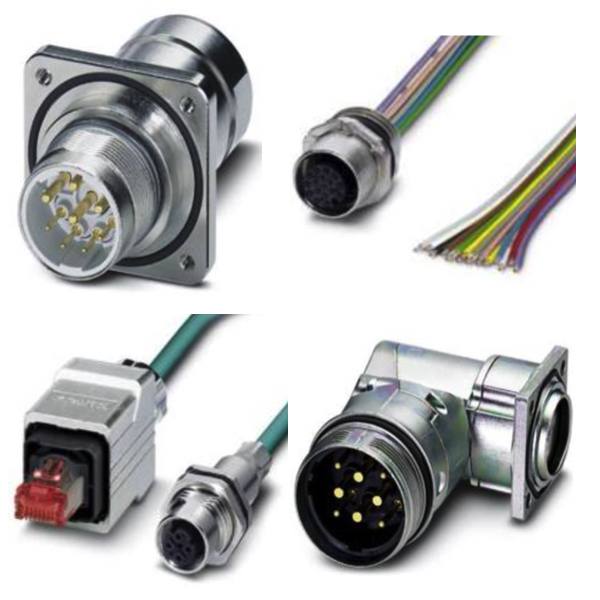Industrial Connectors

RSP Supply carries a full line of industrial connectors designed to deliver reliable power distribution, secure data transmission, and long-term durability in industrial and automation systems. These connectors ensure dependable performance in demanding applications such as manufacturing, process control, energy management, and transportation.
Industrial connectors come in many configurations to suit various power, signal, and control applications. They are built to provide stable and interference-free connections for both low-voltage control systems and high-current power circuits. In modern industrial automation, connectors are vital for maintaining efficient communication between devices, machinery, and control panels.
Heavy-duty connectors are ideal for rugged environments where vibration, dust, temperature extremes, and moisture are present. Their sealed housings, precision contacts, and corrosion-resistant materials ensure stable connectivity even in the harshest conditions. Meanwhile, modular connectors offer enhanced flexibility, allowing the combination of power, signal, and pneumatic lines within a single housing - reducing cabling complexity while improving efficiency and space utilization.
From cable outlets and junction systems to rectangular and circular connectors, RSP Supply offers a variety of solutions that simplify installation and maintenance, improve uptime, and safeguard equipment from environmental hazards.
More Information about Industrial Connectors
In modern industrial systems where space requirements, high power loads, and signal integrity must be balanced, the use of the right connection technology is increasingly important. Connectors are now engineered to meet specialized needs, including high performance applications and installations requiring fast assembly, maintenance, and customization. Some configurations are designed specifically for high speed data transfer and signal reliability, ensuring that communication between machines and systems remains uninterrupted. Whether integrating heavy duty connectors for machinery or modular options with terminal block modules for compact control systems, industrial connectors play a vital role in ensuring safe, efficient, and scalable connectivity across today’s complex industrial networks.
FAQs
Q: What types of industrial connectors are available at RSP Supply?
RSP Supply offers heavy-duty, modular, circular, and rectangular connectors designed for power, control, and data transmission in industrial and automation systems.
Q: Are heavy-duty connectors suitable for outdoor or harsh environments?
Yes. Heavy-duty connectors are built with sealed housings, corrosion-resistant materials, and IP-rated protection to perform reliably in outdoor and high-vibration environments.
Q: Can industrial connectors handle both power and data transmission?
Absolutely. Many modular connector systems allow simultaneous transmission of electrical power, control signals, and data, optimizing performance and minimizing cabling needs.
Q: What connection technologies are used in industrial connectors?
Industrial connectors use various technologies, including crimp, screw, spring, and push-in terminals, to ensure secure, low-resistance connections suitable for high-performance installations.
Q: Are there connector options for compact control cabinets or automation systems?
Yes. RSP Supply offers compact modular connectors and cable glands designed to maximize space efficiency and maintain high signal integrity within control cabinets.
Why Buy Industrial Connectors from RSP Supply
At RSP Supply, we provide trusted industrial connector solutions from leading brands to ensure safe, efficient, and durable connectivity in any environment. Our extensive inventory includes heavy-duty, modular, and high-performance connectors available for same-day shipping at competitive prices.
With expert technical support and a focus on industrial reliability, RSP Supply helps customers find the right connector for every application - whether it’s power, automation, or control system integration. Trust RSP Supply to keep your operations connected and running efficiently.

